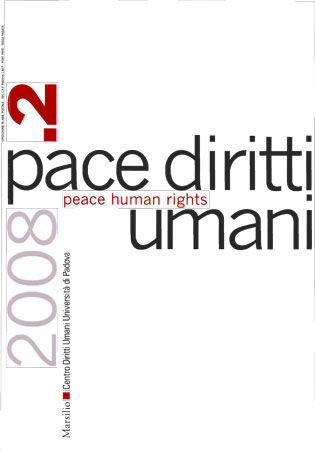Raccolte

La centralità del paradigma diritti umani nell’identificazione della vittima di tratta
- Contenuto in
- Pace diritti umani - Peace Human Rights, 2/2008
- Tipologia pubblicazione
- Articolo / Saggio
- Pagine
- 43-80
- Lingua
- IT
The Centrality of Human Rights Approach in the Victim of Trafficking Identification Process
Paola Degani, Roberto Della Rocca
Since 2000, significant progress has been made against trafficking in human beings, most notably in relation to awareness raising and through the introduction of domestic legislations in many states which makes trafficking for both sexual exploitation and labour exploitation criminal offences also in relation to the ratification of the Protocol to Prevent, Suppress and Punish Trafficking in Persons, Especially Women and Children, supplementing the UN Convention against Transnational Organized Crime. A human rights centred approach is based on an early identification and assistance to victims of trafficking in human beings. Identification is fundamental to guarantee both the protection of the rights of trafficked persons, and to provide positive result to the prosecution of the traffickers.
The complexity of the trafficking phenomenon often implies that the final identification of the victims requires a prolonged and a lengthy process. An error or a failure in identifying victims can mean a not sufficient protection of victims and implies violation of their rights. Today we can verify that the lack of awareness of the fact that someone could be a victim and not an offender, without a correct identification and recognition as victims of crime, can unjustly imply prosecution because of irregular status, possession of false documents, pimping or other violent crimes.
In the identification phase is fundamental to take into consideration the principle of the dignity of the person and the human rights paradigm. The identification phase encompasses activities that are related both to criminal proceedings and to assistance and protection measures.
In a number of member states law enforcement authorities or agencies have developed profiles or checklists or indicators for the identification of victims and perpetrators of trafficking. Multi-agency cooperation to identification and referral cooperation between law enforcement and NGOs or other service providers could be defined in different forms of official recognition, including cooperation agreements.
The human rights approach emphasizes unconditional assistance to all victims of trafficking. International instruments indicate a minimum standard of assistance measures which must be ensured to trafficked persons at different stages of the identification process, during the reflection period and the duration of the residence permit.
In recent years, the experience developed, especially in Italy, shows clearly that a proper protection of victims increases the possibility and the opportunity to contrast these crimes, thanks to the relationship of trust that is built between the victims and the subjects in contact with them, first of all, personnel of law enforcement agencies. In other words, a correct application of certain principles and obligations recognized in the international and regional human rights law, creates a conducive environment to achieve successful investigations and prosecutions.

